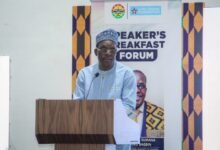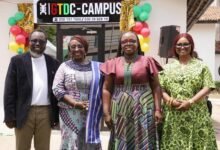‘Use Masjid to make impact in society’

A Ghanaian chaplain in the US Army, Colonel Dawud Agbere, has asked Muslims to use the Masjid (mosque), to make an impact in their individual lives and in the society in general.
He explained that the Masjid was a community, because Muslims congregate in it to worship five times a day.
Col Agbere who was delivering a Khutbah (sermon) at the Cantonments Police Central Mosque last Friday, urged Muslims to network, strengthen their relationship by contributing to improve the well-being of society.
“We all have responsibilities toward Allah, we can make a difference in the lives of people,” Col Agbere told the congregation.
He said the Masjid must not only be seen as a place of worship, but a place to rally around and make a difference in the lives of people, adding that Ibadat ( worship) was inextricably intertwined with social life.
“Muslims must serve as role models,” he added.
Col Agbere who is with the FBGA Garrison Religion Support office in Fort Benning, said it was unacceptable to see people living in poverty when others had enough, stressing on the need to share in the bounties of Allah as the Islamic religion enjoins the followers to do.
“If the Masjid is lively and actively in our lives, we shall not remain backward,” he added.
He called on Muslims to invest more in the education of their children, build schools and health facilities to augment the government’s efforts.
‘It is now more rewarding to build health facilities and schools, we now have more Masjids,” he added.
The Ghanaian chaplain touched on leadership and the role of the Imam, explaining that the role of the Imam transcended beyond leading prayers to mobilising the people to impact society.
He said leaders must have a vision to be able to lead their people, adding that when God created Adam, he had a vision for him.
Col Agbere said leadership was very important at every level, from the family to the national level and urged Muslims to be good leaders as they were accountable to their creator.
He urged Muslims to hold their leaders accountable, adding that the Masjid must be used to discuss and find solutions to challenges facing the community.
The Director of Islamic Religious Affairs of the Ghana Police Service, Superintendent Imam Hussine Abdul-Rahim Hussine urged Muslims to be responsible to their duty to Allah.
In another development, the officials of the Ghana AIDS Commission were in the mosque to engage with Muslims, as part of the activities marking World AIDS Day, and seek partnership with the Muslim community in the prevention and control efforts.
The commission organised a voluntary counselling and testing for the worshipers.
By Salifu Abdul-Rahaman







